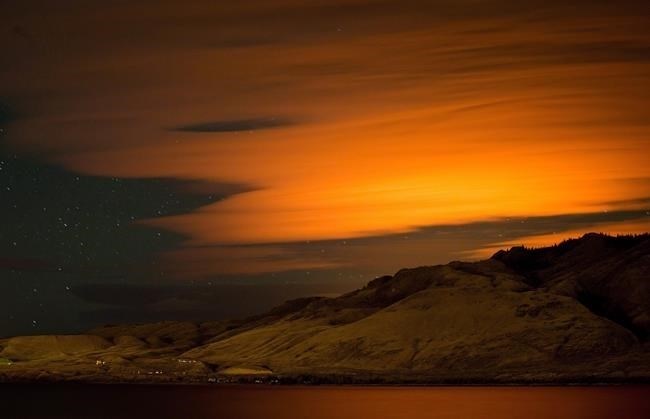
FILE PHOTO - The Elephant Hill wildfire burns in the distance near Clinton, as seen from behind a mountain on Kamloops Lake in Savona, B.C., on July 30, 2017.
Image Credit: THE CANADIAN PRESS/Darryl Dyck
March 18, 2024 - 4:09 PM
VANCOUVER - British Columbia needs a drenching of rain to alleviate the tinder dry conditions that have forecasters worried about the potential for another difficult wildfire season.
Cliff Chapman, director of operations for the BC Wildfire Service, said parts of the province need between 40 and 60 millimetres of rain over two weeks to return the parched ground to what he would consider a “neutral state.”
Chapman said at a public briefing on Monday that droughts across parts of the province continue and the snowpack is just 66 per cent of normal.
"It's not so much about being concerned for us, it's about being prepared," he said. "That's what we're focused on."
Forests Minister Bruce Ralston said the province is securing more equipment and aircraft, and is deploying new technologies to help fight expected wildfires.
"The season will ultimately be shaped by how much rain B.C. receives this spring and into June. It's clear that it's likely to be a challenging wildfire season this year as we continue to see the impacts of climate change," he said.
The province is also launching a predictive software program across the province to give decision-makers more information, faster.
The Forests Ministry said in a statement the addition of the technology follows successful trials of the software in the Coastal and Kamloops fire centres last year, and it will be introduced to the rest of the province throughout this year.
The software uses existing maps and weather models and information about forest fuels, then allows BC Wildfire Service personnel to submit their observations from the field to help with real-time decision-making.
The update from forecasters on Monday said new human-caused fires have already been discovered this year because of the incredibly warm, dry and windy conditions.
They say numerous holdover wildfires in the northeast have smouldered through the winter, and once the snow melts and the land dries out, moderate winds will be enough for them to start burning again.
Last year's wildfire season saw more than 28,400 square kilometres of forest and land burned, hundreds of homes were destroyed and tens of thousands of people were forced to evacuate.
Minister of Emergency Management Bowinn Ma said people should set aside some time in the next couple of weeks to meet as a family and discuss evacuation plans.
She said people can now create an online profile with the province's emergency support services branch, before an emergency happens, to help them access funds and supports in the event they are forced out during an emergency.
"While the province moved very quickly last year to step in to help, for many evacuees, the damage was done. These are the worst moments of people's lives and we know that timely access to supports is critical," she said.
"That's why an expanded team of emergency support specialists within my ministry is ready to be deployed to communities who need that extra support and a new one-day training program will allow communities to quickly surge up volunteers when they need to do so."
The forecast says there is potential for prolonged drought, and communities and businesses need to take water-conservation measures early.
Premier David Eby told an earlier news conference where he announced $80 million to help farmers cope with drought, that the province "can't afford to be subtle" when it comes to climate change.
"The climate here in B.C. is changing really rapidly," he said.
"We are seeing records set for everything from drought to snowfall to heat and what we are hearing from experts is that this summer might be a very difficult one."
The premier attributed the conditions to the cumulative effects of low snowpack, drought and higher temperatures.
Meanwhile, the Insurance Bureau of Canada issued a statement telling residents to prepare for "some potentially difficult months ahead,"
Ma encouraged homeowners to get insurance but acknowledged it could be difficult for some people to afford.
Based on conversations with the Insurance Bureau of Canada, Ma said there are no areas in B.C. where a resident is unable to be insured for wildfire.
"Now, that doesn't necessarily mean every single insurance company provides it and it doesn't necessarily mean that that insurance is affordable to that individual. And that is a reality that I recognize may be the case for people and something that we're looking to grapple with."
This report by The Canadian Press was first published March 18, 2024.
News from © The Canadian Press, 2024